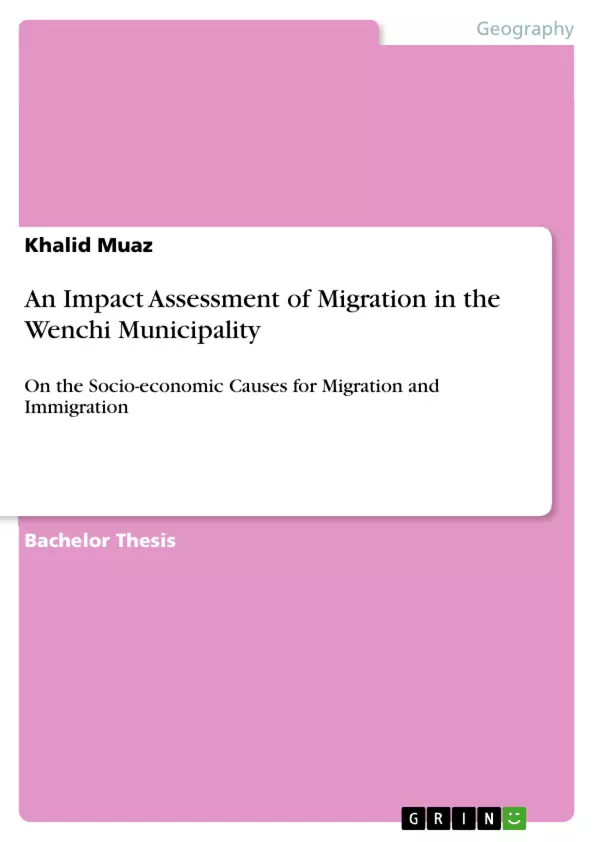This work takes a closer look at the different causes for both migration and immigration in the municipality of Wenchi.
Migration is one of the aspects of human existence that is keen to the designing of policies and programmes of development of any given country. The main aim of the study is to examine the causes of in-migration in the Wenchi municipality, the socio-economic conditions of migrants, the benefits and side effects of migration in Wenchi and to bring out suggestions and recommendation on the management of migration in the municipality. In order to attain a reliable research, both the qualitative and the quantitative research methods are employed. The qualitative method is used to survey the entire municipality to determine the possible causes of migration and migrants’ livelihood. The quantitative method is used to collect in-depth information about the problems at hand. The data is from both primary and secondary sources. The primary source entails self-administered questionnaires, while the secondary source is from articles, publications and projects in relation to the research topic.
The study reveals that most migrants come to Wenchi for educational purposes. It also brings out that most migrants have good access to some basic facilities such as access to portable drinking water and a good access to electricity. In order to ensure that natives get access to good work doing, the stake holders of the town should try to introduce some youth empowerment programmes in the town so as to bridge the gap between natives and migrants.
Inhaltsverzeichnis (Table of Contents)
- CHAPTER ONE
- INTRODUCTION
- Background to the study
- Problem Statement
- Research Question
- Measurable Objectives
- Propositions
- Rationale For The Study
- Organisation Of The Study
- CHAPTER TWO
- LITERATURE REVIEW
- Introduction
- Definition of migration
- Migrants
- In-migration
- Out-migration
- Gross migration
- Net internal migration
- Net migration
- Return migration
- Definition of Impact
- Definition of Assessment
- Migration Assessment
- Overview of migration
- Population movement
- History of migration
- CHAPTER THREE
- RESEARCH METHODOLOGY
- Introduction
- Research Design
- Population of the study area
- Sample and sampling techniques
- Instruments for data collection
- Procedure for administration of instruments
- Data analysis
- CHAPTER FOUR
- DATA ANALYSIS AND PRESENTATION
- Introduction
- Distribution of respondents according to background characteristics
- Migration Processes
- Migrants duration of stay
- Migrants' source region
- Pull Factors
- Migrants Current job
- Amount earned monthly
- Monthly Savings
- Access to electricity
- Access to water at home
- Purpose of sending money at home
- CHAPTER FIVE
- SUMMARY, CONCLUSION AND RECOMMENDATIONS
- Introduction
- Summary of the findings
- Conditions of migrants in Wenchi
- Factors Improving Wellbeing
- Conclusions
- Recommendations
Zielsetzung und Themenschwerpunkte (Objectives and Key Themes)
This dissertation aims to explore the impact of migration on the Wenchi municipality in Ghana. The study investigates the causes of in-migration, the socio-economic conditions of migrants, and the benefits and side effects of migration on the municipality. The research seeks to provide recommendations for managing migration effectively within Wenchi.
- Causes of In-migration in Wenchi Municipality
- Socio-Economic Conditions of Migrants in Wenchi
- Benefits and Side Effects of Migration in Wenchi
- Effective Management Strategies for Migration in Wenchi
- Impact of Migration on the Lives of Both Migrants and Local Residents
Zusammenfassung der Kapitel (Chapter Summaries)
- Chapter 1: This introductory chapter sets the context for the study, outlining the background, problem statement, research question, measurable objectives, propositions, rationale, and organization of the dissertation.
- Chapter 2: This chapter delves into the existing literature on migration, defining key concepts such as in-migration, out-migration, gross migration, net internal migration, net migration, and return migration. The chapter also explores the impact and assessment of migration, providing an overview of migration and its history.
- Chapter 3: This chapter focuses on the research methodology employed in the study, outlining the research design, population of the study area, sample and sampling techniques, instruments for data collection, and the procedure for administering these instruments. It also discusses the methods used for data analysis.
- Chapter 4: This chapter presents the data analysis and presentation of findings, examining the distribution of respondents according to background characteristics, migration processes, migrants' duration of stay, source region, pull factors, current jobs, monthly earnings, savings, access to electricity and water, and the purpose of sending money home.
Schlüsselwörter (Keywords)
The core keywords and topics of this study include migration, in-migration, socio-economic conditions, impact assessment, benefits, side effects, Wenchi municipality, Ghana, management strategies, and youth empowerment programs. This research examines the multifaceted aspects of migration and its influence on the Wenchi municipality, emphasizing the need for effective management strategies to mitigate potential challenges and maximize the positive contributions of migrants to the community.
- Citar trabajo
- Khalid Muaz (Autor), 2015, An Impact Assessment of Migration in the Wenchi Municipality, Múnich, GRIN Verlag, https://www.grin.com/document/453968



